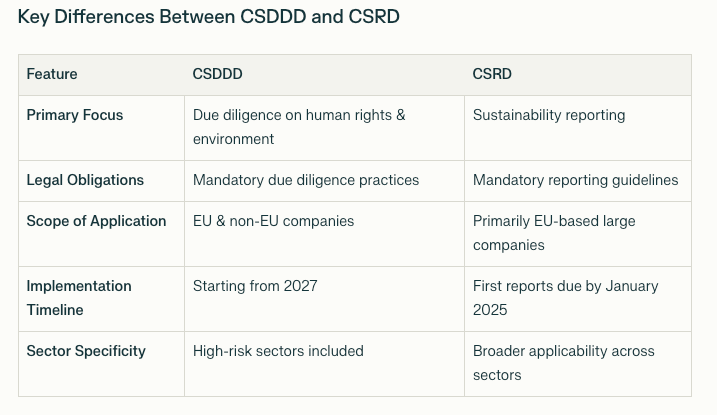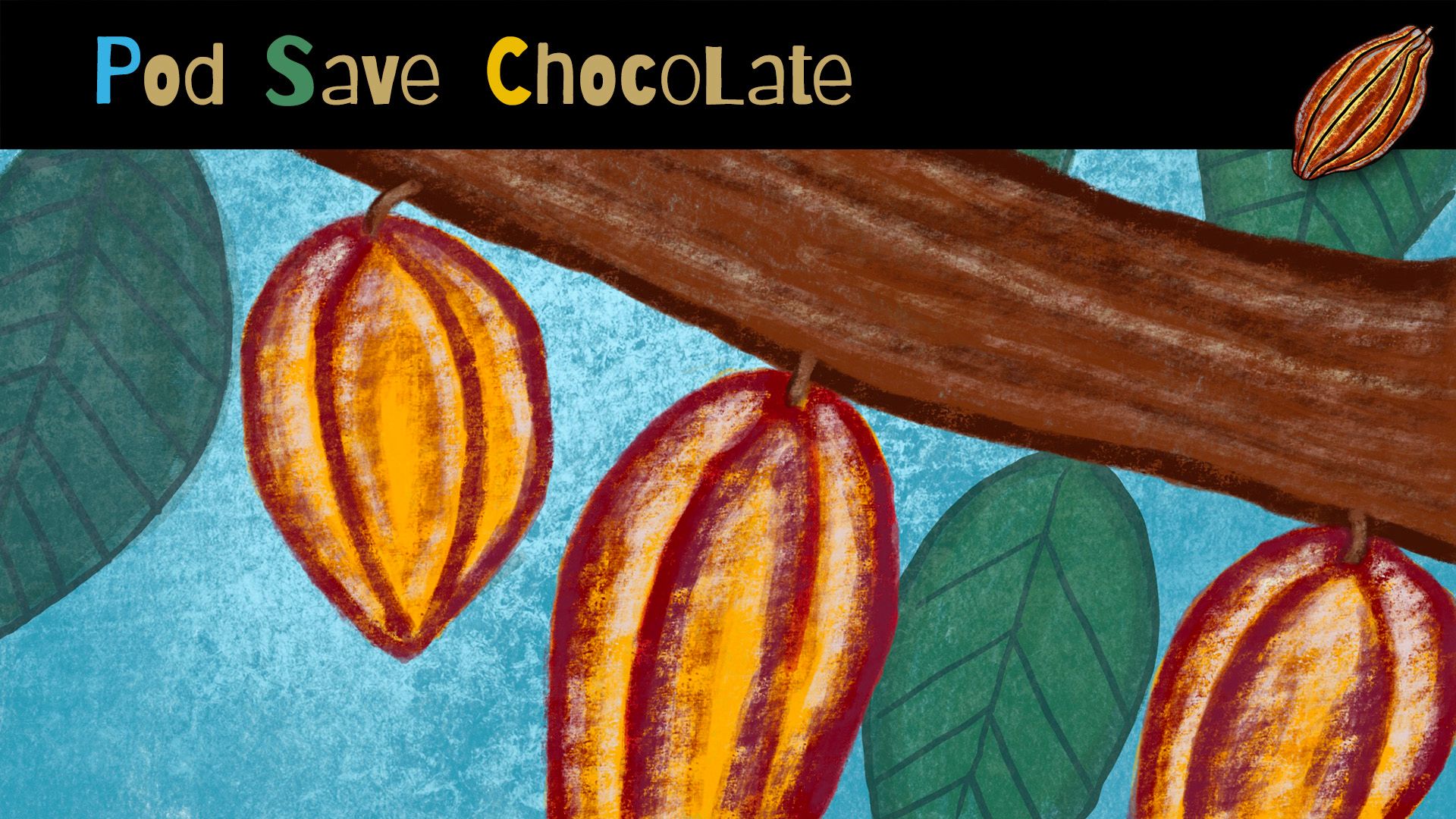The EUDR, CSDDD, CSRD, and ESRS | #PodSaveChocolate Ep82

Episode 82 of #PodSaveChocolate features an exploration of four related EU regulations that affect the cocoa and chocolate industries – how they relate and who needs to worry about compliance will be addressed.
When and Where to Watch
Links to watch/comment LIVE – or to view the archived episode – on all three platforms:
Click on this (shareable) link to watch on YouTube. Please subscribe (free!) to the @PodSaveChocolate YouTube channel, like this video, comment, and share this episode to help grow the #PSC community.

This LINKEDIN link is shareable.

This FACEBOOK link is shareable.
Episode 82 Overview
The collection of acronyms comprised by the EUDR, the CSDDD, the CSRD, the ESRS, and related legislation represent intimidating additions to the legislative soup for companies located in the EU and for non-EU companies that do business (or want to do business) in the EU.
Which of these, if any, does your cocoa and/or chocolate business need to worry about?
Purpose and Scope
The EUDR aims to:
- Minimize the EU's contribution to global deforestation and forest degradation
- Reduce greenhouse gas emissions and biodiversity loss
- Promote deforestation-free supply chains
It applies to specific commodities and derivative products:
For the EU, six commodities — oil palm (34.0%), soy (32.8%), timber (8.6%), cocoa (7.5%), coffee (7.0%), and cattle (5.0%) — account for the largest percentage of deforestation.
Key Requirements
- Due Diligence: Companies must conduct due diligence to ensure products are a) Deforestation-free (not produced on land deforested after December 31, 2020); and b) Produced in accordance with relevant laws of the country of production
- Information Collection: Gather detailed information on products, including geolocation coordinates
- Risk Assessment and Mitigation: Evaluate risks of non-compliance and take steps to mitigate them
- Due Diligence Statement: Submit statements confirming compliance before placing products on the EU market
Companies are required to collect precise geographical information on the farmland where the commodities that they source have been grown, so that these commodities can be checked for compliance. Member States need to make sure that not complying with the rules leads to effective and dissuasive penalties.
Implementation Timeline
- Entered into force: June 29, 2023
- Application date for large companies: December 30, 2024 (proposed extension to December 30, 2025)
- Application date for SMEs: June 30, 2025 (proposed extension to June 30, 2026)
Enforcement
- Member states to designate competent authorities for enforcement
- Penalties include fines up to 4% of annual EU turnover, product confiscation, and exclusion from public procurement
Impact on Businesses
Companies will need to:
- Establish robust due diligence systems
- Enhance supply chain traceability
- Collect and manage large volumes of data on products and suppliers
- Prepare for increased regulatory scrutiny
Purpose and Scope
The CSDDD establishes legal requirements for companies to conduct due diligence on human rights and environmental impact throughout their operations and value chains. It applies to:
- EU companies with over 1,000 employees and €450 million in global turnover
- Non-EU companies with turnover in the EU meeting similar thresholds
- Smaller companies in high-risk sectors like textiles, agriculture, and minerals, with lower employee and turnover thresholds
Key Requirements
Companies subject to the CSDDD must:
- Integrate due diligence into corporate policies and management systems
- Identify and assess adverse human rights and environmental impacts
- Prevent, mitigate, and address negative impacts
- Establish complaint mechanisms
- Monitor the effectiveness of due diligence measures
- Publicly communicate on due diligence efforts
Large companies are also required to adopt plans to ensure their business strategies align with limiting global warming to 1.5°C, in line with the Paris Agreement.
Implementation Timeline
- The CSDDD entered into force in July 2024
- EU member states have until July 2026 to transpose it into national law
- Application to companies will be phased in over 3-5 years after entry into force
Enforcement and Penalties
- EU member states must designate supervisory authorities to enforce the directive
- Companies may face fines of up to 5% of global turnover for non-compliance
- Affected parties can seek compensation for damages caused by non-compliant companies
Purpose and Scope
The CSRD modernizes and strengthens the rules concerning social and environmental information that companies must report1. It applies to:
- Large EU companies (over 250 employees and €40 million turnover)
- Listed SMEs (with some exceptions)
- Non-EU companies generating over €150 million on the EU market
Key Requirements
Companies subject to the CSRD must:
- Disclose information on sustainability risks and opportunities
- Report on their impact on people and the environment
- Provide sustainability information in their management reports
- Submit data in a standardized digital format
- Have their reported information assured by a third party
Implementation Timeline
- January 5, 2023: CSRD entered into force
- January 1, 2024: Application begins for large public-interest companies (500+ employees) already subject to the Non-Financial Reporting Directive (NFRD)
- January 1, 2025: Application extends to other large companies not previously subject to NFRD
- January 1, 2026: Application begins for listed SMEs and other undertakings (with the option to opt-out until 2028)
Reporting Standards
Companies will report according to European Sustainability Reporting Standards (ESRS), which were published in the Official Journal on December 22, 20231. These standards:
- Apply to all companies under CSRD scope, regardless of sector
- Are tailored to EU policies while aligning with international initiatives
- Cover various sustainability aspects, including environmental, social, and governance factors

Purpose and Scope
The ESRS aims to standardize and improve corporate sustainability reporting across the EU by:
- Making sustainability reporting more accurate, consistent, and comparable
- Reducing corporate greenwashing through codified reporting standards
- Providing clarity for investors, consumers, and other stakeholders to evaluate companies’ sustainability performance
Key Features
- Developed by the European Financial Reporting Advisory Group (EFRAG)
- Formally adopted by the European Commission on July 31, 2023
- Applies to companies covered by the CSRD
Structure and Content
The ESRS consists of 12 sections covering:
- General principles and disclosures
- Environmental standards: Climate change, pollution, water resources, biodiversity, circular economy
- Social standards: Workforce, value chain workers, communities, consumers
- Governance standards: Business conduct
Reporting Requirements
Companies must:
- Use the same reporting period for sustainability as for financial statements
- Apply the principle of double materiality, reporting on: a) Impact materiality: The company's impact on sustainability matters; and b) Financial materiality: How sustainability issues affect the company financially
- Submit reports in European Single Electronic Format (ESEF/XHTML)
- Digitally tag information using iXBRL for machine readability
Implementation Timeline
- January 1, 2024: ESRS enters into effect
- 2024-2029: Phased implementation based on company size and Non-Financial Reporting Directive (NFRD .PDF) legacy status
- June 2026: Expected release of sector-specific ESRS (postponed by two years)
Links

My chat with Antonie Fountain of VOICE Network on the EUDR


Additional links will be added after the episode airs.
Questions?
If you have questions or want to comment, you can do so live during the episode or, if you are a ChocolateLife member, you can add them in the Comments below at any time.
Episode Hashtags and Related Accounts to Follow
#EUDR #CSDDD #CSRD #ESRS #NFRD #iXBRL
#cocoa #cacao #cacau
#chocolate #chocolat #craftchocolate
#PodSaveChoc #PSC
#LaVidaCocoa #TheChocolateLife
Future Episodes
#PodSaveChocolate and #TheChocolateLifeLIVE Archives
To read an archived post and find the links to watch archived episodes, click on one of the bookmark cards, below.



Audio-only podcasts
Become a Premium ChocolateLife Member!
| These offers are available to free members, so subscribe above then click one of the following links. | |
|---|---|
| Team TCL Member Monthly membership | First 2 months FREE (save $10/yr) |
| Team TCL Leader Monthly membership | First 2 months FREE (save $30/yr) |





